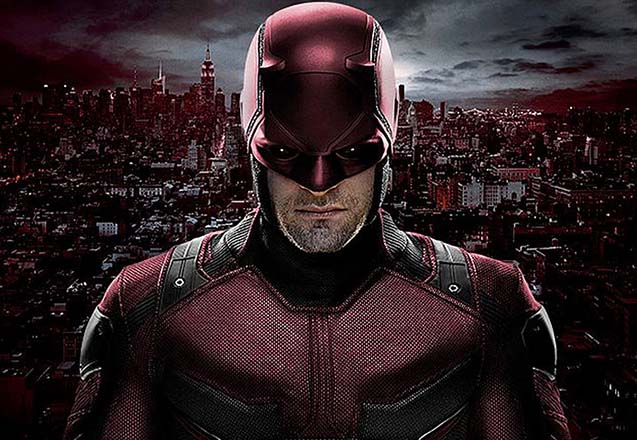Ricochet is the best place on the internet to discuss the issues of the day, either through commenting on posts or writing your own for our active and dynamic community in a fully moderated environment. In addition, the Ricochet Audio Network offers over 50 original podcasts with new episodes released every day.
 Heroes, Violence, and the Devil’s Tempation
Heroes, Violence, and the Devil’s Tempation
 Editors’ Note: This post contains spoilers regarding the first seasons of “Daredevil” and “Jessica Jones”, as well as references to other superhero movies and shows.
Editors’ Note: This post contains spoilers regarding the first seasons of “Daredevil” and “Jessica Jones”, as well as references to other superhero movies and shows.
Given its dependence on violence, the superhero genre struggles under a childish reluctance to explore its implications. As a general rule, superheroes — exemplified by Batman and Superman — are not allowed to kill their antagonists, but are expected to bring them to justice and (hopefully) repentance. Villains don’t always live to commit another crime or threaten another city, but they are far more likely to meet their end through suicide or their own hubris, rather than at the end of a hero’s fists, blade, or — God forbid — gun. And even when this hero’s rule is broken (even Superman and Batman have killed), it’s rarely give the weight it deserves, and is often undone by the genre’s reliance on resurrection and reboots.
https://youtu.be/m5_A0Wx0jU4
This problem was particularly acute in the first season of “Daredevil”, as Matt Murdock’s refusal to kill is presented as admirable but unquestionably leads to a great deal of innocent (and preventable) death. The show’s inability to deal with this was laughable at times, but frustrating at others. Wilson Fisk may not be the wickedest villain in the Marvel universe, but he was a selfish brute who was indifferent to human suffering if it stood between him and power. He needed to be stopped and Murdock’s prohibition on killing — but moral ease with very nearly everything short of that — deserved a more honest accounting. As it was, the series retained a pre-teen morality, even if its levels of blood and gore were well into R-rated territory.
In contrast, “Jessica Jones” approached the subject with much greater maturity, giving — in turn — good reason for Jones to keep Kilgrave alive, showing the tragic consequences of that choice, and showing what happens when circumstances change. We were still inhabiting a world where villains can mind-control others at a word through a “virus” but this is much more mature and thoughtful stuff.
Based on the newly released trailer for the second season of “Daredevil”, however, it seems we’re in for a bit of grappling with this, as Murdock confronts Frank Castle (aka, the Punisher), a vigilante who shares none of Murdock’s scruples. More importantly, the trailer shows Castle landing some rhetorical punches on Murdock, questioning his naiveté and — through him — the show’s own first season.
I hardly expect the series to vindicate Castle — whose vigilantism is every bit as immature as Murdock’s Catholic-flavored boy scouting — but seeing the two in conflict should be interesting.
Published in Culture, Entertainment



Someone else may have already mentioned it in the comments (I ain’t gonna go back and check), but there’s a great line from one of the comics where Batman says that he made the conscious choice to not kill because it’s the only thing that convinces him that he’s still sane.
Well, there’s violence and then there’s “violence”. The Adam West version of Batman also beat criminals into submission. Does that count as being beaten “within an inch of their lives”? It depends on one’s point-of-view.
Apropos of Nothing: 20 (More) Rules Of Movie Universes That Never Happen In Real Life
Yeah, there’s a great moment in the movie where Deadpool is talking to the audience, and someone asks him who he’s talking to.
“Them!” he answers, pointing at us.
Clearly they’d all think he was nuts.
The writers did a great job with this movie, and got their due credit in the opening credits.
I’ve read that, in the movie, they draw a clear line between Wade Wilson and Deadpool. Deadpool knows he’s in a movie, but Wade Wilson doesn’t. Any time he’s not wearing the mask, he doesn’t know he’s a character in a movie.
Neat story gimmick, that.
Not really. The mask is just a piece of cloth, it has no effect on him. I think you’re right that he only addresses the audience wearing a mask, but it’s not a gimmick, as I recall, just a coincidence.
He doesn’t address the audience before he becomes Deadpool, but they don’t make a big deal out of it. I didn’t get the impression that it had any significance.